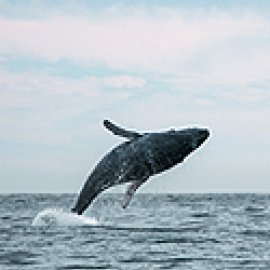Reciprocity, part one, The Art of Giving Thanks
-
English
-
ListenPause
[intro music]
Welcome to World Ocean Radio…
I’m Peter Neill, Director of the World Ocean Observatory.When considering how we must deal with the myriad challenges to the world ocean, the conversation comes always to questions of behavior and values. What must change in how we interact with ocean systems, with the marine environment, with exploitation of marine resources, with coastal protection and development, and with the economic and social necessities we expect the ocean to provide? Given the immensity of the challenge, and the impossibility of a single fix that will make it all better, what specific interim steps must we take to move, with all deliberate speed, in the right direction?
The ocean community has defined various short-term strategies: mitigation, for example, the direct tactical response to certain problems to negate or neutralize their effect. Adaptation is a second approach, one for which there is some logic but which nonetheless compromises response by settling for the existing circumstance as the new normal, accommodating the lesser condition, lowering the bar, giving in. In past editions of World Ocean Radio, I have argued for a third response: invention, the pro-active, creative approach that applies present and future technology, financial incentive, and political action to new ideas, new instruments, new behaviors, new values.
Sustainability is a new value that is advanced to this end. It accepts the finite capacity of Nature to support a burgeoning world population. It proposes new behaviors predicated on this knowledge, that we will only exploit resources to an extent that allows for their renewal and sustainability over time. We will incentivize and promote this new value system through financial tools, price structures, legislative action, regulatory enforcement, and cooperative action. We will stop taking it all, acting unilaterally and independently for unlimited profit, and will reorganize ourselves to maintain and nurture the natural systems that have sustained us, and can continue to sustain us, even as we grow in number, over time if we will make it so.
But what can we do more to convince us at every level that sustainability is an essential core value for our future? Smarter folks than I are struggling with this problem. And clearly the struggle is necessary to counter those who will not consider or accept even the idea, much less the concomitant action, required to make sustainability succeed. What else is required to convince the body politic that such destructive indifference, by individuals, corporations, and governments, is no longer acceptable?
Where I live we are celebrating a holiday of Thanksgiving. In that spirit, what can we do to show our gratitude, to recognize the opportunity in plenty, to give thanks for the fecundity and sustainability the ocean provides?
Let me suggest the concept of reciprocity. This is not a new idea to be sure, but perhaps it might be useful if applied in a new context. Reciprocity is a state of mutual exchange, the categorization of an action by its motivation and consequence in relationship to another. Indigenous peoples have practiced reciprocity as cultural behavior through direct barter and giving of gifts. The cultural anthropologist, Claude Levi-Straus, identified levels of such exchange, through language, kinship, and economics, a process that created bonds of social obligation present and future, an idea familiar through the popular notion of a “favor bank,” a value on deposit that must be paid back in kind.
What if we accepted the power of reciprocity as a standard of behavior at all levels, in all areas of exchange, with Nature? What if we acknowledged that the land and sea provide us value, not for the taking and exhausting as an entitlement, but as the giving of a gift, the making of a loan, with a consequent obligation that we pay back that value in and through complementary behavior, equitable patterns of consumption, and forms of exchange that sustain Nature through accepted future obligation? What if we accept such a reciprocal relationship and system of connection with Nature as our obligation, our contribution, to ourselves, our children, and the public good?
We will discuss these issues, and more, in future editions of World Ocean Radio.
World Ocean Radio is distributed by the Public Radio Exchange and the Pacifica Network for use by college and community radio stations worldwide. Find us wherever you listen to podcasts and at world ocean observatory dot org.
[outro music]
Where we live in the northeastern United States, we are celebrating the holiday of Thanksgiving. In that spirit, what can we do to show our gratitude? What if we accept such reciprocal relationships with Nature as our obligation and our contribution to the public good? Let's all give thanks for the sustainability the ocean provides.
About World Ocean Radio
Peter Neill, Director of the World Ocean Observatory and host of World Ocean Radio, provides coverage of a broad spectrum of ocean issues from science and education to advocacy and exemplary projects. World Ocean Radio, a project of the World Ocean Observatory, is a weekly series of five-minute audio essays available for syndicated use at no cost by college and community radio stations worldwide.
- Login to post comments



